

Leo Laporte. Leo Gordon Laporte (/ləˈpɔrt/; born November 29, 1956 in New York City, New York)[1] is an American technology broadcaster, author, and entrepreneur.
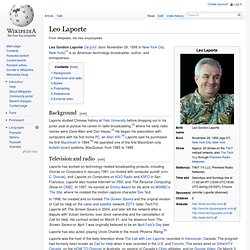
Background[edit] Laporte studied Chinese history at Yale University before dropping out in his junior year to pursue his career in radio broadcasting,[2] where his early radio names were Dave Allen and Dan Hayes.[3] He began his association with computers with his first home PC, an Atari 400.[4] Laporte said he purchased his first Macintosh in 1984.[5] He operated one of the first Macintosh-only bulletin board systems, MacQueue, from 1985 to 1988.
Television and radio[edit] In 1998, he created and co-hosted The Screen Savers and the original version of Call for Help on the cable and satellite network ZDTV (later TechTV). Laporte left The Screen Savers in 2004, and later left the network after a dispute with Vulcan Ventures, over stock ownership and the cancellation of Call for Help. The Social Media Marketing Blog. Rachel Haywire (RachelHaywire) Jolie O'Dell. Dalton Caldwell. Dalton Caldwell (born 1980) is a technologist and digital music entrepreneur.
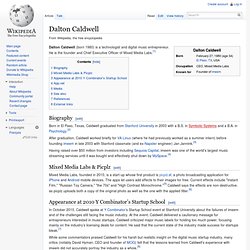
He is the founder and Chief Executive Officer of Mixed Media Labs.[1] Biography[edit] Born in El Paso, Texas, Caldwell graduated from Stanford University in 2003 with a B.S. in Symbolic Systems and a B.A. in Psychology.[2] After graduation, Caldwell worked briefly for VA Linux (where he had previously worked as a summer intern) before founding imeem in late 2003 with Stanford classmate (and ex-Napster engineer) Jan Jannink.[3] Having raised over $50 million from investors including Sequoia Capital, imeem was one of the world’s largest music streaming services until it was bought and effectively shut down by MySpace.[4]
Robert Scoble. Early life and education[edit] Scoble was born in New Jersey in 1965, and grew up about a kilometer from Apple Computer's head office in Silicon Valley.[1] In 1989 while studying in West Valley Community College he met Steve Wozniak, co-founder of Apple Computer, and persuaded him to donate $40,000 worth of Macintoshes to the college journalism department.[2][non-primary source needed] In 1993 he dropped out without finishing his degree in Journalism from San Jose State University's School of Journalism and Mass Communications (he still has one class to complete).[3][4][non-primary source needed]
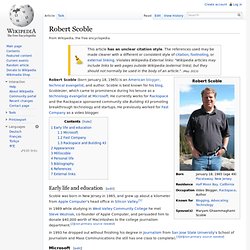
Wil Wheaton. Early life[edit] Career[edit] Acting[edit] Star Trek[edit] From 1987 to 1990, he played Wesley Crusher in the first four seasons of Star Trek: The Next Generation.
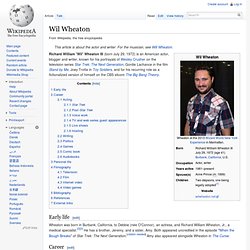
This became a recurring role later in the series. Tom Fishburne: Marketoonist. Guy Kawasaki. Guy Kawasaki (born August 30, 1954) is a Silicon Valley author, speaker, investor and business advisor.
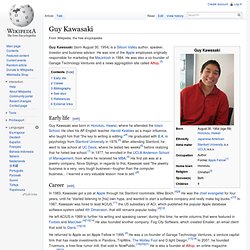
He was one of the Apple employees originally responsible for marketing the Macintosh in 1984. He was also a co-founder of Garage Technology Ventures and a news aggregation site called Alltop.[3] Early life[edit] Guy Kawasaki was born in Honolulu, Hawaii, where he attended the Iolani School. He cites his AP English teacher Harold Keables as a major influence, who taught him that "the key to writing is editing.
Gary Vaynerchuk. Gary Vaynerchuk (born November 14, 1975, in Babruysk, U.S.S.R.
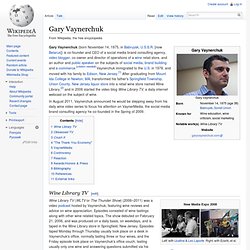
[now Belarus]) is co-founder and CEO of a social media brand consulting agency, video blogger, co-owner and director of operations of a wine retail store, and an author and public speaker on the subjects of social media, brand building and e-commerce. [citation needed] Vaynerchuk immigrated to the U.S. in 1978, and moved with his family to Edison, New Jersey.[1] After graduating from Mount Ida College in Newton, MA, transformed his father's Springfield Township, Union County, New Jersey liquor store into a retail wine store named Wine Library,[2] and in 2006 started the video blog Wine Library TV, a daily internet webcast on the subject of wine.
In August 2011, Vaynerchuk announced he would be stepping away from his daily wine video series to focus his attention on VaynerMedia, the social media brand consulting agency he co-founded in the Spring of 2009. Brian Solis. Career[edit] Solis entered technology marketing and public relationsin 1991, working for the Dodge and Mansfield agency in Ventura, California.[6] From 1996 to 1999, he held the position of Director at The Benjamin Group, a Silicon Valley agency later acquired by Weber Shandwick.[7][8] In 1999, Solis founded FutureWorks, a digital and social media marketing company specializing in digital media, branding, and business strategy.[9] With FutureWorks, Solis led interactive and social programs for Fortune 500 companies, notable celebrities, and Web 2.0 startups.[10] Infographics[edit] Altimeter Group[edit] In 2011, Solis joined the Altimeter Group as a principal analyst.[14][15] He works with businesses on new media strategies and frameworks to connect companies and customers, employees, and other stakeholders.[16] He specializes in digital media and social business strategies.[7]
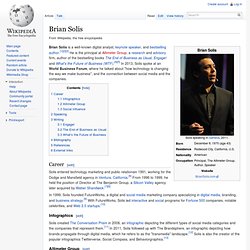
Pierre Lévy. Pierre Lévy (Tunis, 1956) is a French philosopher, cultural theorist and media scholar who specializes in the understanding of the cultural and cognitive implications of digital technologies and the phenomenon of human collective intelligence. He introduced the collective intelligence concept in his 1994 book L'intelligence collective: Pour une anthropologie du cyberspace (Collective Intelligence: Mankind's Emerging World in Cyberspace).[1] Lévy's 1995 book, Qu'est-ce que le virtuel?
(translated as Becoming Virtual: Reality in the Digital Age) develops philosopher Gilles Deleuze's conception of "the virtual" as a dimension of reality that subsists with the actual but is irreducible to it. In 2001, he wrote the book Cyberculture. Pierre Lévy currently teaches at the communication department of the University of Ottawa (Canada),[2] where he holds a Canada Research Chair in Collective Intelligence. Jeff Jarvis. Jan Chipchase. Jan Chipchase is the Executive Creative Director of Global Insights at Frog Design, leading the firm’s global research practice in both mainstream and emerging markets.[1] Before joining Frog Design in 2010, Chipchase was Principal Scientist at Nokia, based out of Tokyo but frequently traveling.[2] The goal of his research was to understand the ways technology works in different cultures, with a focus on understanding technology 3 to 15 years out. out.
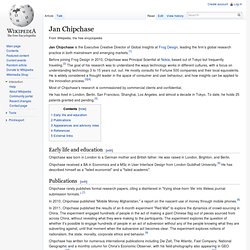
He mostly consults for Fortune 500 companies and their local equivalents. He is widely considered a thought leader in the space of consumer and user behaviour, and how insights can be applied to the innovation process.[3][4] Most of Chipchase's research is commissioned by commercial clients and confidential. Clay Shirky. Clay Shirky (born 1964[2]) is an American writer, consultant and teacher on the social and economic effects of Internet technologies.
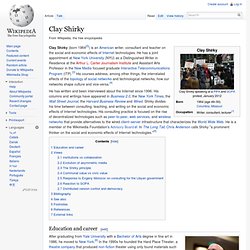
He has a joint appointment at New York University (NYU) as a Distinguished Writer in Residence at the Arthur L. Nicholas A. Christakis. Alex Bogusky. Alex Bogusky is a designer, marketer, author, and consumer advocate; and was an advertising executive and principal of the firm Crispin Porter + Bogusky.
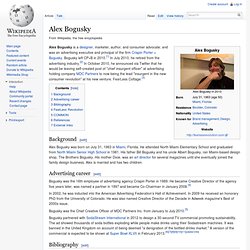
Bogusky left CP+B in 2010.[1] In July 2010, he retired from the advertising industry.[2] In October 2010, he announced via Twitter that he would be leaving self-created post of "chief insurgent officer" at advertising holding company MDC Partners to now being the lead "insurgent in the new consumer revolution" at his new venture, FearLess Cottage.[3] Background[edit] Alex Bogusky was born on July 31, 1963 in Miami, Florida. He attended North Miami Elementary School and graduated from North Miami Senior High School in 1981. His father Bill Bogusky and his uncle Albert Bogusky, ran Miami-based design shop, The Brothers Bogusky. Chris Anderson (entrepreneur) Chris Anderson 2007 Anderson was born in Pakistan in 1957, one of three children.[1] His parents were medical missionaries, and he spent most of his early life in Pakistan, India and Afghanistan.
He studied at a boarding school in the Himalayan mountains of India, Woodstock School, before moving to a boarding school in Bath, UK. At Oxford University, he studied Physics, then changed to Politics, Philosophy and Economics, to eventually graduate in 1978.[1][2] Chris Anderson (writer) Anderson was born in London in 1961. His family moved to the United States, when he was five.[1] He enrolled for a degree program in physics from George Washington University and went on to study quantum mechanics and science journalism at the University of California, Berkeley.[5] He later did research at Los Alamos National Laboratory.
Chris Anderson speaking in Boalt Hall at UC Berkeley. His 2004 article The Long Tail in WIRED was expanded into a book in 2006, titled, The Long Tail: Why the Future of Business Is Selling Less of More.[3][6] It appeared on the New York Times Nonfiction Best Sellers list. The book argues that products in low demand or that have a low sales volume can collectively build a better market share than its rivals, or exceed the relatively few current bestsellers and blockbusters, provided the store or distribution channel is large enough. In 2007, Anderson founded GeekDad, a do-it-yourself blog that later became part of Wired.com. Seth Godin. Philip Kotler. Manuel Castells. Manuel Castells (Spanish: Manuel Castells Oliván; born 1942) is a Spanish sociologist especially associated with research on the information society, communication and globalization. The 2000–09 research survey of the Social Sciences Citation Index ranks him as the world’s fifth most-cited social science scholar, and the foremost-cited communication scholar.[1] He was awarded the 2012 Holberg Prize,[2] for having "shaped our understanding of the political dynamics of urban and global economies in the network society.
Henry Jenkins. Henry Jenkins III (born June 4, 1958) is an American media scholar and currently a Provost Professor of Communication, Journalism, and Cinematic Arts, a joint professorship at the USC Annenberg School for Communication and the USC School of Cinematic Arts.[1] Previously, he was the Peter de Florez Professor of Humanities and Co-Director of the MIT Comparative Media Studies program with William Uricchio. He is also author of several books, including Convergence Culture: Where Old and New Media Collide, Textual Poachers: Television Fans and Participatory Culture and What Made Pistachio Nuts? : Early Sound Comedy and the Vaudeville Aesthetic. Don Tapscott.